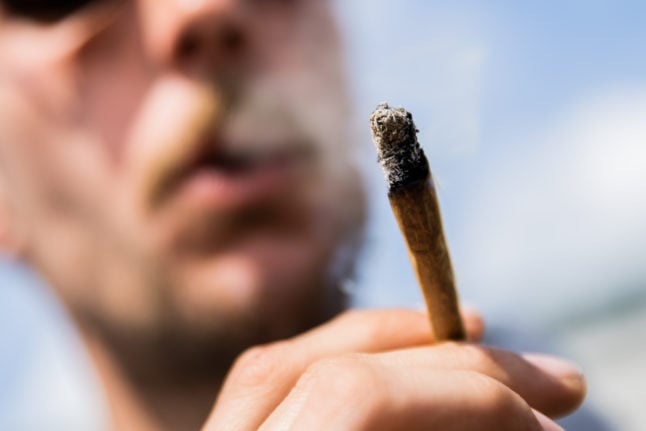It was a slightly jarring sight, but a highly revelatory one: Christian Linder, the sharp-suited, number-crunching Finance Minister, tweeting a word like "Bubatz".
The slang term for cannabis - similar to "ganja" in English - was long the sole property of teenagers smoking weed in skateparks, but if the German government has its way, it could soon take on a veneer of respectability.
When Lindner used it back in May 2022, it was to announce that legalisation of weed - a key pledge of the liberal traffic-light coalition - would be happening "soon". And in recent weeks, the plans have been taking shape.
Eine Frage, die mir viele immer wieder stellen: „Wann Bubatz legal?“. Ich würde sagen: Bald. 🥦 CL https://t.co/42GMJ5UKla
— Christian Lindner (@c_lindner) May 6, 2022
Speaking to The Local's Rachel Loxton on the Germany in Focus podcast, SPD MP Carmen Wegge - one of the rapporteurs working on the cannabis bill - described Germany's move to legalise cannabis as a "revolution" and struck an optimistic tone about the timeline for legalisation.
"This is the question everyone has been asking me for one and a half years, and now we are coming to an end I hope," she said. "We will have the first draft finalised in September or October and in September or October it will go to parliament - so this year will be the year of the cannabis legalisation in Germany."
READ ALSO: German government okays plan to legalise recreational cannabis
According to Wegge, the first phase of the government's plans will see the possession of weed decriminalised (at least up to 25g) and will also allow people to grow up to three weed plants of their own at home.
It will also permit people to establish heavily regulated, non-profit members' clubs that grow and sell marijuana to their members. This phase could come into force between September and December, the SPD politician predicts.
In a second - arguably much bolder - phase, the government plans to set up so-called "model cities" that will pilot the sale of weed in licensed shops - potentially as soon as 2024.
READ ALSO: How Germany's future cannabis clubs could work
So far, Cologne, Hamburg, Leipzig and some districts of Berlin have expressed interest in participating in the pilot scheme, and Wegge says that as long as areas meet all the criteria, there won't be an upper limit on who can join.
"Next year we will have the draft and it will pass the parliament and then we have to see how many cities want to be a model region, if they find producers soon enough and stuff like that, but if everything goes great, we will have it (in place) next year," she added.
Tackling the black market
Of course, not everyone is in favour of moves to decriminalise drugs: in fact, in a recent poll, 49 percent of respondents said they were against legalisation compared to 46 percent in favour.
The plans have been criticised both by the centre-right CDU and CSU parties, who argue that the safety of minors will be endangered by more readily available weed. But Wegge says the idea is simply to create safe channels for a drug that people are consuming anyway.
"In Germany we have a lot of people consuming cannabis, and these people are consuming cannabis from the black market," she said. "In the last few years, the quality of the cannabis on the black market is getting worse and worse with synthetic cannabinoids and stuff like that, so a lot of people who are consuming cannabis - and it doesn’t matter if it’s legal or illegal - are consuming cannabis in a bad way."
READ ALSO: PODCAST: Why Germany wants a cannabis 'revolution' and citizenship vs permanent residency

This is evidence that the drugs policies of the last decades have been the "wrong way", Wegge said. "There is no protection for children and young people."
Instead, the government hopes that legalisation will allow them to better monitor cannabis use and put child protection and prevention measures in place. For example, minors caught with marijuana could have to attend compulsory addiction prevention courses, and drug awareness classes will be taught in schools.
When weed is sold in shops under the new pilot project next year, Germany is also keen to avoid the mistakes made by its Dutch neighbours when it comes to decriminalising the drug.
READ ALSO: Germany's homegrown cannabis industry awaits legalisation
"In Amsterdam, you have organised crime right up to the backdoor of the coffee shop, and that’s something we don't want," she explained, referring to the fact that Amsterdam's coffee shops are generally supplied by black-market dealers.
"So, when you are in a model region, and have, let’s call it a coffee shop, then the cannabis is planted and grown in a state-regulated area. We know what’s inside, what percentage of THC and stuff like that."
Rather than Germany following the Netherlands, it could in fact be the other way around: Wegge says the Netherlands is now looking at moving away from coffee shops and trialling its own model cities.
Shifting gears in Europe
But as Germany looks ahead to a much more liberal future, the elephant in the room is that the country is still restricted in what it can do.
That's because the European Union's Narcotics Act generally insists that activities involving the trafficking, procurement or sale of drugs like cannabis are punishable under national law.
In light of this EU legislation, the government has already watered down its original plans significantly - opting for members' clubs and home-grown cannabis and limiting the wider sale of cannabis to highly regulated shops within its model cities project.
However, according to Wegge, this doesn't mean the government has given up on its original plans: in fact, it has broadened its horizons beyond Germany and is now hoping to overturn the status quo on a European level.
READ ALSO: What you need to know about Germany's plan to legalise cannabis

"We want to legalise cannabis in the way we wanted to do it before, so it will be our aim to change the European law so that every state in the EU can legalise cannabis in this way," she said. "For now we just want to go the safe way, so we’ve changed the way we are legalising cannabis, but it will be our aim or goal to do it in a full version."
In its hopes for its future cannabis market, Germany is looking to some US states - and especially Canada - for inspiration.
"In Canada, the black market has reduced from 100 percent to 50 percent (of the total market share) in four years," Wegge said. "It’s right that the black market won’t vanish in one day when we legalise cannabis, but we can say there’s a big impact on the black market and it will reduce."
In Europe, however, Germany wants to lead the way.
"I’m working on the next steps, I’m in contact with members of the European parliament to change the European law," said Wegge. "So it’s not the end: I would say it’s the big beginning in Germany and maybe for the EU."

Comments